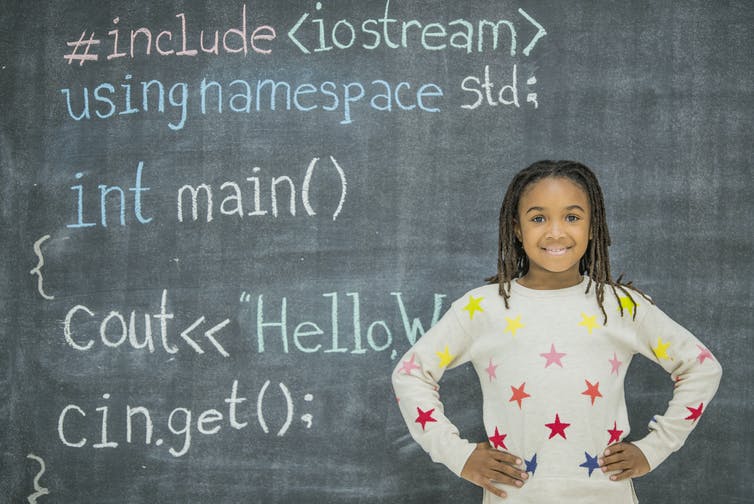
With the right encouragement, girls could become the future stars of coding. Fat Camera / Getty Images
<p><em>The <a href="https://theconversation.com/us/topics/research-brief-83231" target="_blank">Research Brief</a> is a short take about interesting academic work.</em></p>
<h2>The big idea</h2>
<p>It doesn’t take long to help girls see a future for themselves in computer science, but it depends largely on how good their teachers are at recognizing the skills the girls have in coding, which is basically <a href="https://learn.onemonth.com/what-is-coding/" target="_blank">writing language for computers</a>. We found that girls ages 10 to 12 can come to see themselves as coders in <a href="https://doi.org/10.1002/tea.21665" target="_blank">as little as a week</a>. And there are diverse roles within the world of coding that allow girls with various personalities and skill sets to see themselves as coders. However, if educators recognize girls only for when they play a background role and help others, but not when they are more assertive and confident, then they may not develop their assertiveness and confidence in a way that enables them to succeed as coders.</p>
<p>To reach this conclusion, my colleagues and I focused on three girls from different backgrounds – one was Black, one was Hispanic and one was white – who participated in a one-week coding camp. We analyzed over 40 hours of video footage from the camp, interviews with the girls and open-ended survey responses to determine how the camp influenced each girl’s coding identity – that is, their sense of belonging in the field of computer science and their potential for future success.</p>
<p>We found that in order to develop a stronger coding <a href="https://doi.org/10.1002/tea.20237" target="_blank">identity</a>, girls need to have opportunities to develop and perform coding skills. They also need to do so in front of people they view as experts and be recognized for those skills. Our study found that educators’ own biases around gender can affect how they recognize skills and what types of behaviors they recognize. Identity development is a highly individualized experience. The venue also matters. <a href="https://oxfordre.com/education/view/10.1093/acrefore/9780190264093.001.0001/acrefore-9780190264093-e-550" target="_blank">Qualitative methods</a> allow researchers to gather in-depth data to fully explore the multiple issues – in this case issues affecting girls of color in <a href="https://www.emerald.com/insight/content/doi/10.1108/14779960910955828/full/html" target="_blank">coding</a> – like in our case – as well as other <a href="https://onlinelibrary.wiley.com/doi/10.1002/tea.21521" target="_blank">STEM disciplines</a>.</p>
<h2>Why it matters</h2>
<p>In 1990, <a href="https://eric.ed.gov/?id=ED580805" target="_blank">women represented 35%</a> of the computer science workforce. By 2017, this <a href="https://ncses.nsf.gov/pubs/nsb20201/u-s-s-e-workforce" target="_blank">had fallen below 30%</a>.</p>
<p>Coding and programming are <a href="https://dl.acm.org/doi/book/10.1145/3079760" target="_blank">foundational</a> to most science, technology, engineering and mathematics fields. Coding and other STEM careers are some of the <a href="https://www.indeed.com/career-advice/finding-a-job/highest-paying-bachelors-degree-jobs" target="_blank">highest-paying jobs</a> in the U.S. today.</p>
<p>If women are not entering these fields because they don’t think they have the right skills or the right personality to succeed, then they are losing <a class="wpil_keyword_link" href="https://www.schoolnews.co.nz/2015/10/developing-opportunities-at-school-with-a-view/" title="opportunities" data-wpil-keyword-link="linked" target="_blank">opportunities</a> for high-paying positions. And STEM fields are losing the diversity of ideas and input from women that could enhance the technological innovations of the future.</p>
<p>Educators are key to not only teaching girls about coding or how to code but also instilling them with confidence of feeling that they belong and can succeed in the field. Educators need to be aware of their own <a href="https://implicit.harvard.edu/implicit/" target="_blank">implicit biases</a> that can lead to differences in how they recognize what girls can do in coding, particularly <a href="https://www.blackgirlscode.com/about-bgc.html" target="_blank">girls of color</a>, who are even more isolated due to the <a href="https://latinagirlscode.org/" target="_blank">multiple ways</a> they can be made to <a href="https://yrankindetourlab.com/black-women-in-the-computing-ecosystem/" target="_blank">feel like they don’t belong</a>.</p>
<h2>What still isn’t known</h2>
<p>What isn’t really clear is the kind of long-term impact that educators have on girls and their decision to pursue a career in coding and STEM. Researchers need to take a closer look at how girls interpret the recognition and praise they get from their teachers for the things they do in coding.</p>
<h2>What other research is being done</h2>
<p><a href="https://dl.acm.org/doi/abs/10.5555/3381631.3381643" target="_blank">Researchers at Florida State University and Auburn University</a> have been studying how <a href="https://doi.org/10.1007/s10606-017-9292-y" target="_blank">computer science education</a> can be transformed to create more equitable learning environments for Black women and girls.<!-- Below is The Conversation's page counter tag. Please DO NOT REMOVE. --><img style="border: none !important; box-shadow: none !important; margin: 0 !important; max-height: 1px !important; max-width: 1px !important; min-height: 1px !important; min-width: 1px !important; opacity: 0 !important; outline: none !important; padding: 0 !important; text-shadow: none !important;" src="https://counter.theconversation.com/content/146656/count.gif?distributor=republish-lightbox-basic" alt="The Conversation" width="1" height="1" /><!-- End of code. If you don't see any code above, please get new code from the Advanced tab after you click the republish button. The page counter does not collect any personal data. More info: https://theconversation.com/republishing-guidelines --></p>
<h6><a href="https://theconversation.com/profiles/roxanne-hughes-1151382" target="_blank">Roxanne Hughes</a>, Research Faculty, <em><a href="https://theconversation.com/institutions/famu-fsu-college-of-engineering-4273" target="_blank">FAMU-FSU College of Engineering.</a></em>This article is republished from <a href="https://theconversation.com" target="_blank">The Conversation</a> under a Creative Commons license. Read the <a href="https://theconversation.com/teachers-play-a-critical-role-in-shaping-girls-future-as-coders-146656" target="_blank">original article</a>.</h6>

NZCER found generative AI tools are frequently used to support teaching and learning in primary…
The Ministry decision to discontinue a reading resource over kupu Māori has angered the sector…
NCEA was designed to broaden educational success, explains David Pomeroy from the University of Canterbury.
More than just a break from the classroom, a visit to a zoo or wildlife…
Without proper maintenance and care, trees can become a hazard. Are your trees in need…
Loneliness and social disconnection negatively impact wellbeing. A new WHO report finds teens feel the…
This website uses cookies.